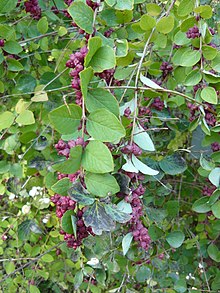Symphoricarpos orbiculatus, commonly called coralberry,[2] buckbrush or Indian currant is a woody species of flowering plant in the honeysuckle family.[3]
| Coralberry | |
|---|---|

| |
| Scientific classification | |
| Kingdom: | Plantae |
| Clade: | Tracheophytes |
| Clade: | Angiosperms |
| Clade: | Eudicots |
| Clade: | Asterids |
| Order: | Dipsacales |
| Family: | Caprifoliaceae |
| Genus: | Symphoricarpos |
| Species: | S. orbiculatus
|
| Binomial name | |
| Symphoricarpos orbiculatus Moench 1794
| |
| Synonyms[1] | |
| |
Description
editSymphoricarpos orbiculatus is an erect, rhizomatous shrub. The leaves are typically oval shaped and arranged oppositely along the branches.[4] The leaves are sessile or subsessile. The flowers are greenish-white and borne in verticils in the leaf axils. The fruit is a purple-red drupe with two stones; the drupes are persistent through winter. Symphoricarpos orbiculatus can reach a height of 6 ft (180 cm), but is typically 3–4 ft (90–120 cm).[4] The plant is monoecious, with male and female flowers on the same individual.[5]
Distribution
editSymphoricarpos orbiculatus is native to the eastern and central United States as well as central Canada (Ontario) and northeastern Mexico (Coahuila, Nuevo León).[2][6][7]
References
edit- ^ "Lonicera symphoricarpos". Tropicos. Missouri Botanical Garden.
- ^ a b USDA, NRCS (n.d.). "Symphoricarpos orbiculatus". The PLANTS Database (plants.usda.gov). Greensboro, North Carolina: National Plant Data Team. Retrieved 6 December 2015.
- ^ Jones, George Neville (1940). "A monograph of the genus Symphoricarpos". Journal of the Arnold Arboretum. 21 (2): 201–252.
- ^ a b "Coral-Berry, Indian Currant, Devil's Shoestring, or Buckbrush". Virginia Tech Weed Identification Guide. Archived from the original on 2013-09-17.
- ^ "Plant database entry for Coralberry (Symphoricarpos orbiculatus) with 24 images, 2 comments, and 50 data details".
- ^ "Symphoricarpos orbiculatus". County-level distribution map from the North American Plant Atlas (NAPA). Biota of North America Program (BONAP). 2014.
- ^ "Symphoricarpos orbiculatus". Germplasm Resources Information Network. Agricultural Research Service, United States Department of Agriculture.